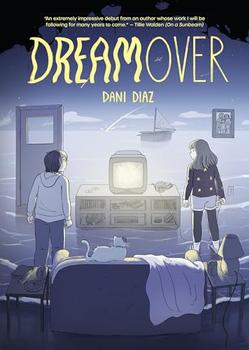Summary | Excerpt | Reviews | Beyond the Book | Read-Alikes | Genres & Themes | Author Bio

This article relates to Dreamover
 In Dreamover, the dreamscapes Amber and Nico experience draw heavily from the imagery and mechanisms encountered in video games. In fact, within the past few decades, scientists and researchers have been investigating the relationship between video games and dreams.
In Dreamover, the dreamscapes Amber and Nico experience draw heavily from the imagery and mechanisms encountered in video games. In fact, within the past few decades, scientists and researchers have been investigating the relationship between video games and dreams.
One consequence of digital gaming on dreams is dubbed the Tetris Effect after the iconic puzzle video game. For people who play the game for a long time, the mental act of rotating and piecing Tetris blocks together becomes so ingrained that they may replicate it in their sleep. And the Tetris Effect is not limited to Tetris. One video game reporter writes that "Even if I've only played an hour of the strategy cooking game [Overwatch 2] before bed, by the time I get into REM sleep I'm frantically dumping my sous-chef's hot rice on a plate and rolling digital maki" in imitation of the sushi-making patterned processes she accomplished while having played the game fully awake.
According to psychologist Rachel Kowert, a primary purpose of dreams is to find solutions to real-world puzzles, like planning a wedding, which is one possible explanation for why problem-solving games are likely to surface in dreamland: the game is an actual, concrete puzzle that we haven't finished solving. According to dream analyst Jane Anderson, dreaming about games can potentially improve players' performance back in reality, akin to "sleeping on it" and awakening with a solution, even if the dream and its unconscious replay of issues are forgotten.
The finding that playing video games can affect people's dreams—which then affect their waking life—has potential therapeutic implications. Psychologist and researcher Jayne Gackenbach has found that gamers are more likely than non-gamers to experience lucid dreams. They know what it's like to be in control in an alternate reality and can even switch between first- and third-person perspectives. These gamers are less likely to be affected by nightmares—they're ready to take control and may even enjoy a dangerous dream situation. (Interestingly, this seems to only apply to men who play video games.)
One related study worked with veterans who struggled with PTSD and were highly susceptible to nightmares; those who played lots of video games were more capable than an average person of getting through difficult dreams. Unlike in the real world, especially a war, in which there is genuine uncertainty over whether you will live or die, someone playing a game knows that the consequences aren't real—which can be empowering knowledge later, during a dream.
In theory, the effect of video games on dreams could also be expanded to then be a benefit to one's waking life. One theory is that nightmares are an evolutionary mechanism meant to "train" us to deal with threats in a safe environment before we encounter them in real life. If gaming helps people feel protected during their "training," it might have benefits after waking up.
Of course, there's a limit to this research, because researchers cannot themselves observe their subjects' dreams; data mostly comes from self-reporting. One other big question about video games is how they may affect children, who are accessing these immersive realities at younger and younger ages. "How does that change their dreaming behavior?" Gackenbach said. "I don't know if I'm nervous about finding out, or really excited."
Filed under Medicine, Science and Tech
![]() This article relates to Dreamover.
It first ran in the February 26, 2025
issue of BookBrowse Recommends.
This article relates to Dreamover.
It first ran in the February 26, 2025
issue of BookBrowse Recommends.
Your guide toexceptional books
BookBrowse seeks out and recommends the best in contemporary fiction and nonfiction—books that not only engage and entertain but also deepen our understanding of ourselves and the world around us.